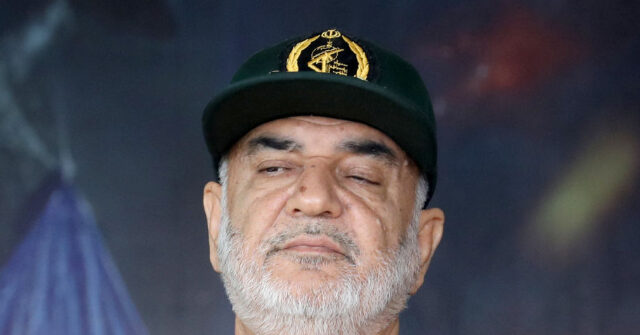The head of Iran’s terrorist Islamic Revolutionary Guard Corps (IRGC), Maj. Gen. Hossein Salami, threatened to “open the gates of Hell” against America and Israel on Thursday, a bellicose declaration reportedly preceding another round of “indirect” American-Iranian talks on Iran’s nuclear program.
The administration of President Donald Trump has launched a negotiation process with the radical Islamist dictatorship in Tehran apparently seeking to establish an agreement to contain Iran’s illegal nuclear development. Three rounds of talks have occurred so far, mediated by the government of Oman. President Trump has described the talks as “direct,” which Iran has rejected; reports following the first round of talks indicated that Iran demanded Oman pass notes back and forth between the Iranian and American delegations, rather than speaking to each other in a civil manner.
Salami is often among Iran’s most violent and aggressive officials as the head of the IRGC, a U.S.-designated terrorist organization. His remarks on Thursday, according to the Emirati newspaper The National, were a direct warning to Trump and the leadership of Israel, a nation Iran regularly threatens with genocide.
“These are serious warnings to the Zionist [Israeli] and American authorities… if you make the slightest mistake, we will open the gates of hell for you,” Salami proclaimed. He reportedly tempered his comments somewhat by claiming that Iran is “prioritizing diplomacy while staying prepared for war.” As a formal arm of the Iranian military, the IRGC is responsible in part for those war preparations.
The National noted that Salami also made remarks apparently intending to split Israel from the United States, warning the Trump administration that Israel was seeking to drag Washington into an “unending war.”
The Islamic Republic News Agency (IRNA), an Iranian state outlet, notably omitted any mention of unleashing hell in its publication of Salami’s remarks, which it reported occurred at the unveiling of a new underground drone base. IRNA highlighted Salami emphasizing that Iran would unleash a violent assault on any country that attacks it as a response, rather than a preemptive attack.
“Any point, in any land that becomes the origin of aggression against us will become the destination of our response — that origin will be turned into a destination,” Salami reportedly said. “Our doctrine dictates that we strike at any point from which our interests are targeted, as well as any other point where our enemy’s interests lie.”
The Iranian regime often uses Salami as a “hardline” public figure to threaten enemies into dialogue with or submission to the country. In March, for example, Salami declared in an interview with Iranian state media that Iran was ready to “respond decisively and destructively” against President Trump’s threats to attack the country for its longstanding sponsorship of terrorism.
Salami’s profile has risen after President Donald Trump eliminated Maj. Gen. Qassem Soleimani in 2020. The head of the IRGC Quds Force, its foreign terrorism unit, Soleimani was eliminated in a drone strike by the U.S. military in Baghdad, Iraq, alongside the head of the terrorist Hezbollah Brigades, Abu Mahdi al-Muhandis. Soleimani’s job, in part, was to organize the operations of Iran’s foreign terror arms, such as the Hezbollah Brigades. Solemani’s successor, Esmail Qaani, has kept a low profile to such an extent that rumors have arisen of his potential imprisonment or purging due to his lack of public appearances.
Salami’s belligerent threats follow reports that Iran and America may engage in a fourth round of talks this weekend, which Iranian media refer to as “indirect.” Iranian Foreign Minister Abbas Araghchi, who has led the talks for Tehran, is expected to visit Saudi Arabia and Qatar this weekend. Araghchi also reportedly held a conversation on Friday with the head of the International Atomic Energy Agency (IAEA), Rafael Grossi, to discuss Iran’s nuclear program. IRNA reported that the two discussed “the latest developments concerning the indirect talks between Tehran and Washington on the lifting of anti-Iran sanctions,” in potential preparation for new talks with America.
The IAEA is the United Nations’ agency for nuclear energy management. On multiple occasions Grossi has pronounced himself frustrated with Iran’s disrespect for international law, lamenting in June 2024 that the Joint Comprehensive Plan of Action (JCPOA), the nuclear agreement brokered by Barack Obama in 2015, “exists only on paper and means nothing.”
At an event in September, Grossi revealed that Iran had blocked his agency’s efforts to monitor its uranium enrichment.
“You will note Iran’s stockpile of uranium enriched up to 20 percent and up to 60 percent continues to increase, and that Iran has expanded the number of cascades it is using to enrich UF6 [Uranium hexafluoride],” Grossi explained. “It has been more than three and a half years since Iran stopped implementing its nuclear-related commitments under the JCPOA, including provisionally applying its Additional Protocol and therefore it is also over three and a half years since the Agency was able to conduct complementary access in Iran.”
Talks between Tehran and Washington have not at press time yielded any meaningful agreements.
Follow Frances Martel on Facebook and Twitter.
Read the full article here


